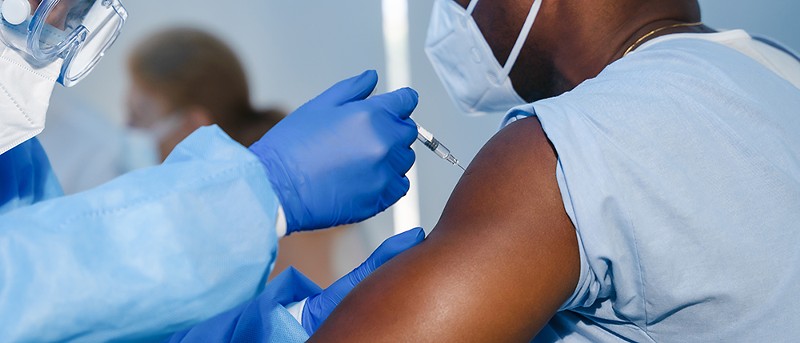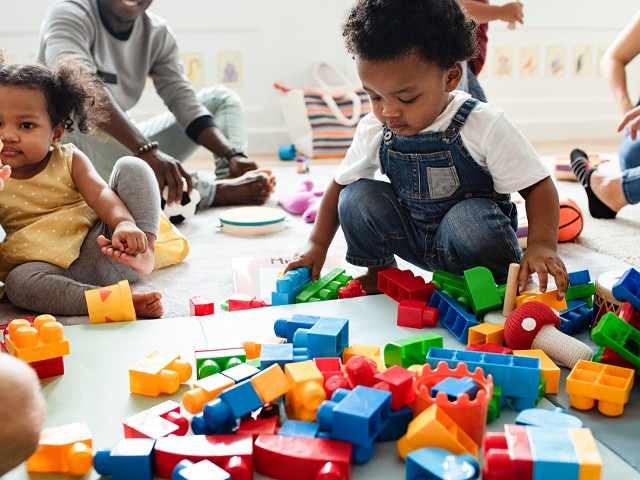Governor Gretchen Whitmer has ordered all Michigan residents to stay home as much as possible to slow the spread of the coronavirus, the novel virus that has spread to all corners of the globe in 2020 and causes the potentially deadly disease COVID-19. While the virus has made it so we can’t be in close proximity to each other, we can’t get through this alone. Below are some Detroit-area coronavirus relief funds and other resources to help local residents, artists, service-industry workers, and others who could use a helping hand during this unprecedented time.
Did we miss any? Send tips to [email protected]. Stay safe, Detroit — and remember to wear a mask and wash your hands.
Vaccine information
As of December 2020, the first coronavirus vaccines are finally here, including the Pfizer-BioNTech COVID-19 vaccines made right here in Michigan, just outside of Kalamazoo. While the vaccine rollout has been initially slow and bumpy, officials have been expanding prioritization, and they're expected to become widely available in the coming months.• For the most up to date information, visit michigan.gov/coronavirus.
• For detailed vaccination scheduling, click michigan.gov/COVIDvaccine.
• Find vaccine locations by county here.
• Detroit is accepting registrants for its vaccination center at Ford Field which is expected to open on Wednesday, March 24 and operate seven days a week from 8:30 a.m. to 8 p.m. for eight weeks. You can register at clinic.meijer/register/CL2021 or by texting EndCOVID to 75049. You can also call 888-535-6136 for more information.
• Detroit is also doing drive-thru vaccinations at TCF Center. You can make an appointment by calling 313-230-0505 or find out more about eligibility here.
• All Michigan residents 16 years old and up will be eligible to receive the vaccine starting April 5. For more information, visit michigan.gov/coronavirus.
Are the vaccines safe?
Many Americans have expressed skepticism over the rapidly developed vaccines, but officials say at least 85% of the population needs to be vaccinated before things can go back to some semblance of normal. While the vaccines are unapproved, the U.S. Food and Drug Administration issued an Emergency Use Authorization. Health officials said the vaccines have received enormous scrutiny, and the reactions to the shots are tracked regularly to ensure they're safe. Clinical trials have shown vaccines are 95% effective and have modest side effects, if any at all.Note: The vaccines don't make you immune to the virus, or make you unable to pass it to others — they just make it so you'll be unlikely to require hospitalization if you get it. So we'll have to continue to do social distancing and wear masks in public until a majority of people become vaccinated.
How are vaccines prioritized?
According to the Michigan Department of Health and Human Services, the state hopes to vaccinate 70% of people ages 16 and older — or about 5.6 million people — by the end of 2021.Michigan's vaccination rollout is broken into phases. You can learn about them here. Initial prioritization is being given to eligible frontline essential workers (health care workers, school and child-care staff, frontline responders, and corrections staff) and people over the age of 75.
Does it cost money to get vaccinated?
Nope! Apparently vaccine doses are made possible via U.S. taxpayer dollars (so that's where that money goes…) and vaccinations will be made available in phases for no cost regardless of insurance status.What if I need help getting to the vaccine site?
Initially, people couldn't make vaccinations appointments at TCF Center unless they had a car or someone with a car to take them. The city has now partnered with IntelliRide Inc. to provide local drivers to shuttle people to TCF Center. Rides are $2, but the city will waive fees for anyone who can't afford them. More information is available by calling 313-230-0505 or visiting Detroit's COVID-19 vaccination website here.What is the coronavirus?
Exposure to the coronavirus can cause COVID-19. Reported cases have ranged from mild symptoms to severe illness and death. The following symptoms may appear 2-14 days after exposure:• Fever
• Cough
• Shortness of breath
• Fatigue
• Muscle of body aches
• Sore throat
• Congestion or runny nose
• Nausea or vomiting
• Diarrhea
If you develop emergency warning signs for COVID-19, get medical attention immediately. Emergency warning signs include:
• Difficulty breathing or shortness of breath
• Persistent pain or pressure in the chest
• Bluish lips or face
This list is not all-encompassing; consult your medical provider for any other symptoms that are severe or concerning.
Health officials recommend taking the following steps to prevent the spread of the coronavirus:
• Wear a mask in public
• Avoid large gatherings, only interact without a mask with one other household with a maximum gathering size of 10 people • Wash your hands frequently, with soap and water for at least 20 seconds
• Avoid close contact with sick people
• Stay home if you’re sick
• Cover your mouth if you cough or sneeze
• Clean and disinfect frequently touched surfaces
General coronavirus information
The Centers for Disease Control and Prevention
cdc.gov/coronavirus
Michigan coronavirus information
michigan.gov/coronavirus
Detroit coronavirus information
covid313.org
Michigan COVID-19 Community Response
micovidcommunity.com
Various COVID-19-related resources for Michigan.
Volunteer
michigan.gov/fightcovid19
Gov. Whitmer, the Michigan Department of Health and Human Services, and the American Red Cross partnered for a new volunteer website for trained medical professionals to register to serve their fellow Michiganders by assisting hospitals in fighting COVID-19. Other state residents can also use the site to find out how they can help in their local communities, give blood, donate money, or needed medical supplies, or assist public health officials in tracking infections.
For restaurants
Good To-Go Detroit
metrotimes.com/GoodTo-GoDetroit
Metro Times' database of restaurants offering carry-out, curbside delivery, online ordering.
Save MI Faves
savemifaves.org
This database helps you purchase gift cards from Michigan restaurants, which can help your favorite spot weather this economic downturn.
The Food Rescue program
bit.ly/detroitfoodrescue
The City of Detroit has partnered with Forgotten Harvest and Detroit restaurants to “rescue” surplus food that would otherwise go to waste and donate it to area agencies for residents in need. Participating businesses get tax deductions. Restaurants with a surplus of perishable food and the ability to transport to nearby agencies are asked to sign up on the website.
Bartender Emergency Assistance Program
usbgfoundation.org/beap
The United States Bartenders Guild is offering grants to bartenders affected by the virus. You do not need to be a USBG member to apply.
Restaurant Workers’ Community Foundation Relief Fund
restaurantworkerscf.org
The Restaurant Workers’ Community Foundation COVID-19 Emergency Relief Fund is offering grants to individual workers affected by the virus and zero-interest loans to businesses.
One Fair Wage Emergency Fund
ofwemergencyfund.org
One Fair Wage launched an emergency fund to provide immediate assistance to restaurant employees.
Another Round Another Rally
anotherroundanotherrally.org
Offers $500 relief grants for hospitality workers who lost their jobs or had their hours cut because of the virus.
For service-industry workers with COVID-19
coregives.org
Offers assistance to service-industry workers who’ve tested positive for COVID-19 and have a child living in their home.
Tip a random Detroit-area service-industry worker
serviceindustry.tips/en/mi/detroit
This website will randomly select a Detroit-area bartender or service-industry worker, so you can tip them anytime you have a drink or meal at home during the shutdown using Venmo or Cash App.
Additional information for service-industry workers
liquor.com
More aid and resources for bartenders is available here. (Thanks to liquor.com for compiling many of the above service-industry resources.)
For artists and musicians
Rapid Response Fundraiser for Artists and Creatives
mocadetroit.org
The Museum of Contemporary Art Detroit has partnered with the City of Detroit Office of Arts, Culture and Entrepreneurship to help local artists sell their work on MOCAD’s website. Local artists should send an email and a single sample of their work to MOCAD Membership Manager Wayne Northcross at [email protected] or the ACE Office at [email protected]. Chosen artists may sell a single piece of art on the site; if a piece sells, the museum will split the proceeds 50/50 with the artist. Buyers are responsible for shipping.
That’s Our Friend Fund
facebook.com/donate/924987944582206
Fund is set up by metro Detroit-based The Gallery Society to raise money through art auctions and to collect donations to help those in the event, entertainment, and service industries who were financially affected by the virus.
Michigan Music Alliance Artist Relief Fund
michiganmusicalliance.org/artist-relief-fund
Fund supports Michigan-based musical artists who have lost income due to coronavirus-related gig cancellations.
Other resources
Mutual Aid Hub
mutualaidhub.org
National database of mutual aid resources.
Support for undocumented immigrants
gofundme.com/f/support-se-michigan-undocumented-families
Support for undocumented families in metro Detroit.
Detroit Sex Worker Mutual Aid Fund
gofundme.com/f/ne5d7
Created by sex-worker collective ANSWER, the Detroit Sex Worker Mutual Aid Fund is a financial resource-sharing space created by Michigan-based sex workers to provide necessary support for fellow sex workers and their families.
Stay on top of Detroit news and views. Sign up for our weekly issue newsletter delivered each Wednesday.







